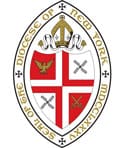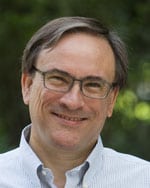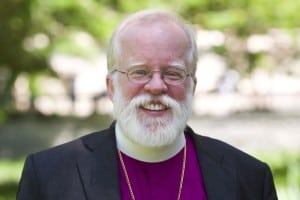Communications Contacts
Mr. Nicholas Richardson
Director of Communications, Editor, Episcopal New Yorker
Office: 212-316-7520
Fax: 212-932-7323
nrichardson@dioceseny.org
Mr. Andrew Gary
Assistant to the Chief of Finance and Operations, Communications & Editorial Assistant
Office: 212-932-7322
Fax: 212-932-7323
agary@dioceseny.org
The Cathedral Church of Saint John the Divine New York City
Merry Christmas!
It is a joy to spend this Christmas Eve with you in this magnificent cathedral. The great good news of the last year was that my friend Dan Daniel, the onetime Bishop of East Carolina and Pennsylvania, accepted my invitation to serve for a time as the Interim Dean of the Cathedral of Saint John the Divine. We were already warm colleagues, but the partnership we share in the leadership of this amazing church and community has only deepened what already was a treasured friendship. It is a pure pleasure to stand at the altar tonight beside him, and to worship with the offerings and gifts of Kent Tritle and our cathedral musicians and singers, as well as the phenomenal Susannah Phillips, and Paul Winter, one of the longest and best friends of Saint John the Divine. Greetings also to the priests and deacons and cathedral staff and acolytes and vergers and ushers and volunteers and florists who have made and shaped this service, and particularly Patrick Malloy, Canon for Liturgy and the Arts, who like a ringmaster has pulled us all together, lined us up, and put on this show. And of course the priests on my own staff who have come to join in the offering of communion. To all of them, and to you, my very best wishes on this holy night.
Earlier this month I read an essay by Matthew Neill Null in the current issue of the Oxford American, in which he reflected on the rich and varied history of Regina Coeli, a three hundred and fifty year old convent in Rome, which was turned into a prison in 1881. The essay is a kind of mixing of travelogue, personal reminiscence and architectural survey, but in the middle of the story he wrote a line which arrested me and has remained with me. “Prisons and asylums, convents and poor farms, halfway houses and nursing homes: these institutions have always drawn my eye. I think, if nothing else works out for me, I can always go there.” I was struck by two thoughts: first, the mingling of his consideration of prisons alongside convents; asylums next to nursing homes. All of these places exist outside the mainstream of social life, but they mean very different things to us. “I can always go there” seems to collapse them into a single phenomenon, and in a minute I’ll say something about what I think that means. My second thought comes from my own experience that these places of the lost and forgotten, the exile and the solitary, are also or can be profound wellsprings of godly transformation. That seems more obvious than it should as regards convents, and less than it should as regards prisons. These are places touched with mystical properties and possibilities.
It has been my practice for some years to go annually to Greenhaven Prison in Dutchess County to baptize all of the inmates who over the previous twelve months have been preparing to accept Jesus and the way of the baptized. These baptisms are done by immersion, and they are sloshingly wet, loud with laughter and shouting, more than a little chaotic, a little bit holy and a little bit violent, utterly pentecostal, and all against the background of the driving rhythm of an inmate gospel band. They are also undeniably transformative. We talk there quite freely of
what it means to drown the Old Man in the tank that we may haul the New Man back up to life. Of rising with Christ. These men step from the tank streaming with water, and I see on faces only moments ago boastful and defensive but now suddenly rendered thoughtful and reflective that they are already beginning to make the interior journey. We talk about the power of Jesus to make perfect freedom behind stone walls and razor wire, and the lived experience of it. I was blind but now I see. A wretch like me. These are men of such passionate conviction that they force me every time as I step up to preach to them to ask of myself: What do I mean when I say, as I do, that I have been saved by Jesus? After three or four hours of church, I step back out through the prison wall into the night and find that I have to emotionally come back down from the rollicking highs to which we were lifted back inside. Eighteen or twenty men are baptized, but two hundred and fifty are born from above. And no one sees and no one knows.
Among my favorite Episcopal nuns are those in the Community of the Holy Spirit. They have a convent here in Harlem, and one up in Putnam County, which is also a farm. They are doing something amazing up there with bringing together sustainable, locally grown farming with the rolling cycle of the daily prayer offices of the church. They are Episcopalians, they are well- seasoned nuns with decades of convent life, and they no longer eat anything but what they have grown. A few years ago I was up there at planting time and I put a young tomato plant into the ground. I still ask them when I see them how my tomato is doing and they tell me it is just fine, but sometimes they tell me that it was delicious. One of the nuns told me several years ago that it is becoming harder and harder to differentiate between the food of the altar and the food in the field; it all seems to them to be so eucharistic. Pilgrims flock to Melrose to walk beside them for a season, to pray in the chapel and weed the fields, for these nuns are leading the way into a sustainable, holy, sacramental, ecological future for an imperiled earth. They are making new learnings about intentional community, and living close to the ground, and preserving and protecting the creation, and praying without ceasing, and loving Jesus, and discovering new ways of being nuns, and more even than that new ways of being people together before history and before God.
These are big deals. Explosions of freedom in largely unseen hidden and maybe unlikely places. Convents and Prisons. The author spoke of the personal deep draw of such places for him. Of the last hope that they represent for the lost. For him, when he is lost. He is right to think that. But prisons and convents — and also asylums and poor farms and nursing homes — are not the same thing, and as I have lived with his words I have wanted to explore what it is that they share and that draw his eye. And I think that it is that they are all of them places that we either seek out and find when we are driven by longing, or choose of our desire, or are forced to by need or necessity, or are dragged to in manacles by others, or where we wind up when the world turns from us its face, or where we find ourselves when we break down and can go no further — but however we get there they are all of them places where the false securities of this world, the lies and half-truths we tell ourselves to survive the day, are cast off by us or are stripped from us and we find that we are left with nothing on which to rely except our own eyes staring straight at God.
It may even be that such genuine transformation, or at least the possibility of it, can only happen in that way. In a place apart. Whether that apartness is prosaically physically geographic or inwardly emotional or spiritual, it must involve some element of remove. I think of Van Gogh’s room at Arles, or Thoreau’s cabin at Walden Pond. I think of Nelson Mandela’s cell on Robben Island or Martin Luther King’s in Birmingham. Of Mother Teresa in her hospice in Calcutta enduring God’s eternal silence, or Saint Anthony in his African desert cave enduring the demons’ eternal clamour. Of Saint Julian in her anchorite cell at the church in Norwich, or the young boy Elie Wiesel in the barracks of Auschwitz. What extreme of lonesome drive moves the spirits of the seventeen year old gymnast alone on the balance beam at the Olympics or the climber in his exhaustion waiting for God to come for him in a frozen crevasse below the summit of Mount Everest? What wisdom is being ferreted out right now on this Christmas Eve in the intensive care rooms of the hospital just a hundred yards from this pulpit? What comforts or admonitions speak into their crisis? And what happy shouts are raised right now in rooms where babies are being born, and what tears in the rooms of the dying? How do we comprehend such mysteries? How do we carry them and live with them? The writer looked upon prison and convent and out to the far margins where powers and principalities fall to impotent silence and said, “this draws my eye.” Oh yes, it draws the eye.
And what was engendered in me from that single line which I read in that essay and which has been a refrain for me through the Advent just passed, is the nagging suggestion that life may happen in its fullest richness not when we are speeding down the fast lane of the interstate, but when we are stranded in a heap on the shoulder of the highway, or getting more and more lost on a side street in the darkness of a strange city in the middle of the night, or when we pull out of the gridlocked traffic to exit onto a road we have never heard of going someplace we don’t know where. The nagging suggestion that any worldly conception of success, of “the right track,” is actually a distraction from those measures that really support life.
But it is Christmas Eve, so let me say that in a different way. That all of these side roads and wrong ways, these hostels and shelters and tents and cells and hospital rooms — convents and prisons — may to those who have eyes to see be revealed really to be holy crèches built by God. In which, and so that, his Son might be born within us. Where we might have the perfect possibility of a transformative experience of God in the most impossible place. If nothing else works out for me, the writer said, when I have failed before the world on the world’s terms, I can go there. And live, perhaps, though he didn’t say this: on other terms, and by another’s leave.
These hidden truths, these hints and suggestions of the very important, elusive something else, are why Christians, and people of every faith, have forever embarked on pilgrimage, or sought retreat. To find in the dislocation of journeying and travel, and the privations of wilderness and hostel, the vulnerability and capacity for personal risk to open themselves sufficiently to the otherwise and previously unimaginable. To cast off the false securities of the world on which we customarily depend — these systems and economies — to discover or have shown to us the empty conceits which such securities really are. That we might be made ready to come before God unencumbered.
The story of Mary and Joseph, and of the birth of Jesus, is just such a story of dislocation, and of what happened to them, and what they discovered when nothing else was working out for them and of how they came finally to their own place apart. Mary was with child, and at the least auspicious time she and Joseph were compelled to leave Galilee and make the arduous
journey across the high country of Israel to Bethlehem, to satisfy the need of the Roman tax collector for census. They come to us in the Christmas story out of a poverty well established by the evangelist, as strangers on a pretty long hard road and as strangers knocking at the gate. Immigrants and refugees. In Bethlehem, we are told, there was no PLACE for them. When my friend was being beaten by a mob in India for the offense of founding a church to serve the Untouchable, his attackers yelled at him, “You are out of place; you are out of place!” — perhaps the sojourners Mary and Joseph were out of place in Bethlehem. Unwelcome. Yet somehow in the stable or the cave or the shed or under a tent or outside in the cold windy field Mary gave birth to Jesus and laid him in the manger where the animals come to feed. No one saw and no one knew. Hard as prison stone and gentle as the convent’s whispered prayer. And there the shepherds sought them out — who had heard something that sounded to them like the voice and song of angels and then acted on what they had heard.
And in their crèche, cast out on their own, unseen and beyond caring, and with the world and its burdens, and what passes in the world for reason and truth, shaken from their shoulders, they found themselves staring straight at God. Then it seems they were able to look upon their newborn and believe the impossible thing, that he was the Christ, the Messiah. And there were signs of angels too, whatever we are to make of that. Privation gave birth to want and want to hope and hope to credulity, and perhaps they found in that hour of possibility the eyes to see beyond crèche and manger to the full unfolding Gospel to come, even the cross of their same Jesus, and to understand there at the beginning of everything the purposes and desires of God and the coming of a Kingdom built entirely out of the love that lies behind and beneath and over all things. And understand for the first time the mind of God and the meaning of their own lives. I’ve seen that very thing happen in real life. Or maybe it was simpler. That they might look upon the wonder that is a brand-new child and see that which is both obvious and astonishing: that God is all the time doing a new thing in our midst. These are the good tidings and great joy. That Jesus was born in Bethlehem, born to them, and that redefined everything, and ultimately redefined them too. That is how you tell truth from wish dream. It stands up. And it’s never what was expected. So maybe they always had to get out of Nazareth and get lost and find a different place apart in order to see and discern the new thing, and not miss the point when it happened.
The stories of Christmas, of the birth of Christ, are so familiar to us. But they come to us tonight as invitation. May we let the wonder and mystery of this night, told in ancient myth and eternal longings, lifted in music and song, and surrounded by all of this sublime beauty, carry us away from the destructive assumptions of a world which is spinning away from itself. To a place apart, where we may look upon God with eyes made fresh. Not everything has to be clear to be understood. Let us wait and watch together under the turning of the stars of this night, this holy night, spent together here in this holy temple, and may it be for us even for a little while our place apart, our crèche. That we may go on a journey together for a little while, and see this Jesus born to us, born in us, that we may by the grace of God get a glimpse of what those men at Greenhaven and those nuns at Melrose know: the freedom and the possibilities down in the deep, deep hidden truth of God. That in the eternal, forever coming of Jesus there is a whole new world. And a beautiful new morning. Amen.
Merry Christmas!




